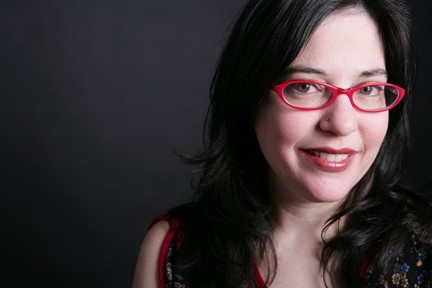This is a guest post by Abigail Pickus, a writer based in Jerusalem. Check out her site: www.abigailpickus.com. This article originally ran in The Jewish Week and is being reprinted with permission.
 There I was at the bank, when suddenly, one of the employees appeared, talking at me in rapid fire Hebrew.
There I was at the bank, when suddenly, one of the employees appeared, talking at me in rapid fire Hebrew.
It seems she recognized my name displayed on the computer of the banker helping me as she very innocently made her way back to her schmooze corner, I mean, desk, and it was a good thing she did because it turns out she tried calling me that very morning! Why did I not pick up?
I blinked. This is my new tactic when I don’t understand all of the Hebrew.
And here’s the thing about my newfound tactic: it works. Which is another way of saying, when I sit there mute and blinking, like a naked mole rat in the headlights, people make decisions for me.
So it was decided that I was to go to city hall post haste to fetch some kind of form. Why? Because I was late paying my arnona (residential property tax) and therefore the city had put a lien on my ability to pay. Which is why I needed a form to remove the lien to enable me to pay.
Does that make any sense?
No. It. Does. Not.
Nor does it make sense that a renter, like myself, has to pay property tax. Or that Jerusalem’s arnona is so astronomically high to compensate for the fact that many of its fervently Orthodox and Arab residents are exempt from paying.
As someone wise once said to me, “It’s not for us to know everything.”
And so, armed with the name of the form I needed jotted down for me in Hebrew to show to the clerk – like an illiterate – I made my way downtown to Safra Square.
I’m not going to lie: I barely leave my neighborhood. So this was, indeed, cause for celebration, particularly because Jaffa Street is now especially festive with the addition of the European looking light rail.
And then there is Kikar Safra itself, the cluster of municipal buildings surrounding a plaza that is also almost regal. (Almost.)
 I won’t go into details about my bureaucratic adventure because, really, it wasn’t an adventure at all. And it wasn’t much different than going to city hall in Chicago, for example, except this being Jerusalem, the waiting room was full of kippot and shtreimels and hijabs.
I won’t go into details about my bureaucratic adventure because, really, it wasn’t an adventure at all. And it wasn’t much different than going to city hall in Chicago, for example, except this being Jerusalem, the waiting room was full of kippot and shtreimels and hijabs.
Oh, and except for me, everyone was jabbering away on his or her cell phone.
I couldn’t chat on my cell phone even if I wanted to since I had dropped mine that very morning and it was collecting dust in my bag, in what the doctors would call serious condition.
But this isn’t about cell phones or religious headwear, but rather about the clerk with the streaked blonde hair who immediately told me I had to pay the whole sum right then and there.
I don’t need to tell you it was a hefty sum, either.
I blinked. And then told her I wanted to pay it in installments.
“Impossible,” she said, stamping what seemed like a mound of papers, handing them back to me, and telling me to return to my bank today – hurry, hurry! – and be sure to bring these forms, which will enable me to pay in installments.
Do you want to know the moral here, my fellow Americans?
I’ll tell you the moral. It’s that in the U.S. of A, if a bureaucrat tells you how to proceed, chances are they’re telling you the policy, which means there is no leeway.
But in Israel, when you’re told how to proceed – especially if you’re told in a very commanding tone – it’s not the policy so much as a preference. A suggestion, really.
So while the directive is often unmovable – in my case, paying a bill – the means are negotiable. Which is a complicated way of saying, in Israel, everything is negotiable.
I know this and yet I’m still surprised every time.
It would be a lie to say that once I got outside and felt a gentle breeze against my face that I rushed to the bank to pay up.
I did not. Instead, I found myself on Shlomzion Hamalka street and like a homing pigeon, went straight to a sweet little café called Kadosh where I made myself comfortable.
I took it all in: the delectable pastries in the glass display case, the aproned bar man making café hafuchs, Louis Armstrong on the radio, and around me people chatting in Hebrew, French and English.
There was time enough to pay my dues – at the bank and back at work, where deadlines awaited. But for that very moment it was just me and a mozzarella and pesto on toast.
As Someone (important) once said after putting in a hard day’s work, “And it was good.”
(Photo: FeatheredTar)

